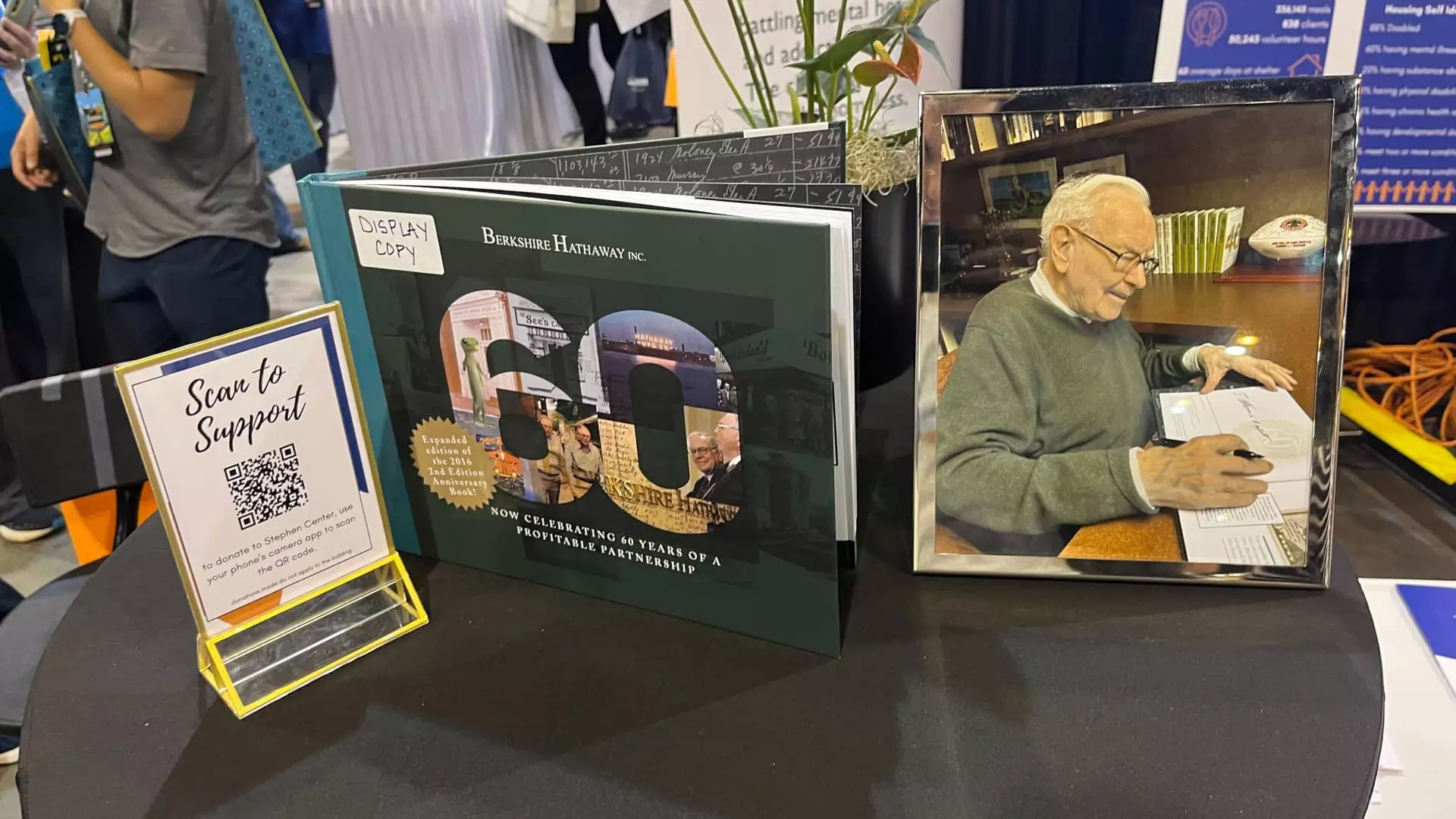In the heart of Omaha, excitement buzzed like electricity as Berkshire Hathaway held its annual meeting—a spectacle that brought together thousands of shareholders and devotees of Warren Buffett. Typically characterized by staid discussions about investments and markets, this year’s event took on an exhilarating twist. The auction of a limited number of signed anniversary books, “60 Years of Berkshire Hathaway,” sparked a frenzy, resulting in expected bids climbing into six figures. Yet, beneath the surface of this high-stakes auction lies a labyrinthine narrative centered around philanthropy and community service, which reflects the heart and ethos of Buffett himself.
The expectation of bidders lining up to offer hefty amounts for memorabilia was not just about the books but also a reflection of the underlying charity aimed at benefiting the Stephen Center in Omaha. This shelter provides vital services for homeless individuals and those battling addiction—an issue that resonates deeply, particularly in today’s socio-economic climate. Beyond being merely objects of memorabilia, these signed books have materialized into vessels of hope and support for a cause larger than any individual contributor.
Buffett’s Charitable Impact
The astronomical total of over $1.3 million raised for the Stephen Center serves as a testament to Buffett’s moral compass. By pledging to match each dollar raised, Buffett redefined the auction’s stakes, transforming it from a mere bidding war into a philanthropic venture. Chris Knauf, the Stephen Center’s CEO, articulated the sheer gratitude stemming from Buffett’s generosity, underscoring that such contributions extend far beyond monetary value. They echo into the realm of community resilience, where these funds will contribute to essential initiatives like addiction recovery and the construction of a women and children’s center.
In today’s climate, where inequality has often overshadowed compassion, Buffett’s actions stand out. His commitment, which dates back decades, emphasizes that philanthropy isn’t just an act of generosity; it’s an obligation, especially for billionaires whose financial footprint influences broader societal issues. As Knauf points out, philanthropy has the potential to metamorphose into community awareness—drawing attention to the often invisible struggles facing the homeless and marginalized populations within Omaha and beyond.
A Personal Connection
The stories of winning bidders like Matthew Rodriguez and Jay Ji illuminate a personal connection to Buffett’s mission. Rodriguez’s spirited investment to secure a signed book, which he described as “priceless,” illustrates more than just fan devotion; it exemplifies a shared belief that community support is a collective responsibility. The act of bidding, while an investment in a signed edition of a book, doubles as a declaration of intent to support local initiatives.
Furthermore, Ji’s winning bid and his undertaken tour of the Stephen Center emphasize a deeper engagement with philanthropy. For many, the decision to partake in such donations goes beyond financial capability; it taps into personal histories and collective experiences. As Ji noted, the urgency to alleviate hardships stems from his childhood economic challenges, showcasing how philanthropy can be deeply intertwined with individual narratives.
Rethinking Philanthropy and Wealth
What makes Buffett’s approach particularly compelling is his disdain for creating dynasties, as articulated in his previous correspondence. He asserts that the economic fortresses built by inherited wealth often undermine social progress. Rather than bequeathing vast sums to descendants, Buffett advocates for a paradigm shift—encouraging both affluent families and society at large to reconsider the implications of inherited wealth versus earned responsibility.
His philosophy promotes a more sustainable model of giving, demonstrating that wealth can be an agent of change when vested in community support. This thinking gets a timely respelling amidst rising inequality; with shelter populations surging, community-based initiatives have never been more critical. Buffett’s stance is a call to arms for the ultra-wealthy—encouraging them to join the vanguard of social responsibility.
Legacy Through Giving
Lastly, it’s worthy to note the broader implication of Buffett’s actions in a generation often skeptical of wealth and its implications. As social movements gain traction and demands for social justice amplify, champions like Buffett provide a roadmap for navigating the complexities of wealth and its responsibilities.
For many in the crowd at the Berkshire meeting, the auction wasn’t merely a transaction; it exemplified a cultural shift where philanthropy transcends altruism and serves as a form of societal engagement. In today’s world, where fear and distrust often drive a wedge between the affluent and the impoverished, Buffett’s actions serve as a clarion call, urging people to take risks—not just with money, but in forging a meaningful legacy. His engagement with the Stephen Center illustrates a refreshing model, one that prioritizes human dignity and community welfare over indulgence.

